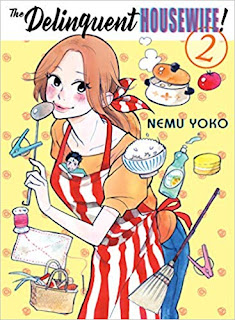Volume 2 picks up right where Volume 1 left us with the fairly obvious setup of Dai falling for Kumugi, his brother's new wife. Komugi is an ex-gang member, hopeless with household tasks, and unemployed - and hiding this all from her new mother-in-law. Her husband, Tohru, has mysteriously left the country on an extended business trip with no definite plans to return. His mom, Komugi's mother-in-law, starts the volume confronting Komugi about her gang jacket. Sensing this is the perfect opportunity to come clean, Komugi confesses everything, except her gang affiliation witch Dai forces her to keep secret. One of the most interesting aspects of this volume is the underlying reason why Dai doesn't want his mom to know. We get a bit of insight into the family and some depth out of Dai's mother.
The focus of volume 2 was heavily on Dai's perspective with little time given to learning about, or seeing the world through the eyes of, Komugi. That's a shame. Komugi has all the makings of a classic character. We get some of her in the form of job hunting, but really this is a volume about Dai and his feelings about Komugi. We spend some time with two of his high-school friends, including Yoshino who clearly loves him and drives the central plot of this volume. But this focus on Dai is my one criticism of volume 2.
I firmly believe that Tohru is an ass. You don't just up and leave your new wife with no definite plans to return. So with Dai having feelings for Komugi, we're supposed to root for him to eventually win her over. However, I want to ask why?
Through two volumes, Dai is not a very well defined character. He's a random high-schooler, with no obvious personality other than general niceness. Even his younger sister is given more nuance in volume 1. Volume 2 doesn't help this much. All we see from Dai is constant (if somewhat amusingly done) perseveration on Komugi (his fantasies, hearing her name everywhere, etc... are well done). This begs the big question, a question that if unresolved will undermine the quality of this series: "why should the audience root for Dai other than because of his greater availability to Komugi compared with her husband Tohru?"
If the only thing Dai has is that he's available, well, so are millions of other single people in Japan. Why would we want Dai to end up with Komugi? If she isn't going to stay with Tohru, and right now she seems totally devoted, why would we want her with Dai? What does he have to offer her? What uniqueness is there in his personality that makes him a better fit other than undying teen, hormone-driven, adulation? Komugi is a richly depicted and quirky heroine, Dai is random blandness. She deserves more.
As I stated in my review of volume 1. My hope for the series is that Komugi realizes Tohru is an ass, things develop slightly between Komugi and Dai, but that in the end Komugi realizes he's still a child and there is a greater world out there for herself, now that she's learned to stand on her own. Ultimately I want her leaving Tohru AND Dai. A melancholy ending.
While this is still my hope, its value would be undercut if Dai isn't developed more. It would still be my preferred ending, but how much more powerful would it be if Dai was truly a great fit, but also too young (and still Tohru's brother - so complexity!) and so things ultimately couldn't be?
We're only two volumes in, so there is plenty of time for Dai to be developed, but it needs to happen. Otherwise, this volume was a ton of fun. Dai's lack of identity was a huge hole however.
The art is fun and fluid. It's relatively simple, with almost non-existent backgrounds (however, there are two panels done in the negative - white on black that are pretty cool), and this style of fast bold art works with the brisk pace and constant humor of the series. Screentone use is very very simple, most of the art is just black and white line art with solid black coloring if needed. Not my personal favorite art style, but it works really well for this story. Characters are recognizable and there is almost no fan service of any sort, other than when Dai is checking out Komugi and that makes sense given his age.
Basically, both the series and volume 2 are fun and engaging but haven't yet arrived at the potential that exists. If we keep seeing Komugi's growth into adulthood, and get more nuance out of Dai, then this has the ability to be a really solid series. As it stands however, it is still a lot of fun and a bit different than other series out there and a worthy read. Volume 2 ranks a solid 7/10.
✩🚺


No comments:
Post a Comment
Remember: please talk about the work, and offer counter points to others' analyses but DO NOT ATTACK THE PERSON whose analysis you are countering. (no ad hominem comments) Thanks! <3